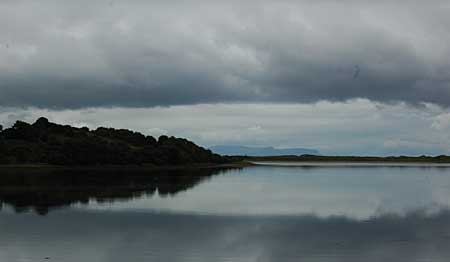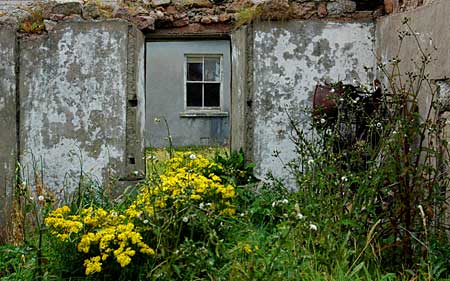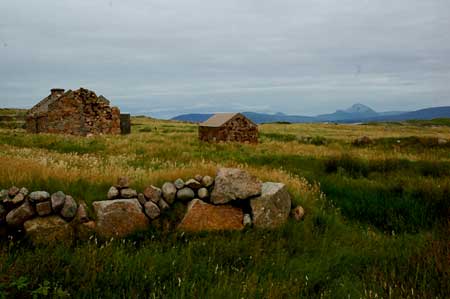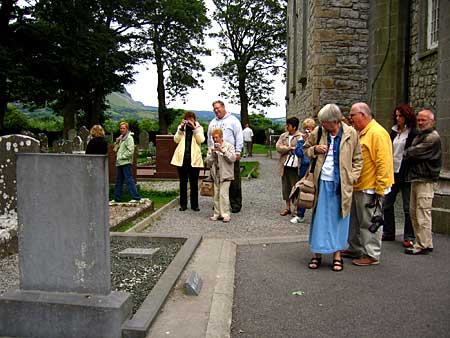
Donegal Bay, this morning, with the Sligo mountains in the background.


Donegal Bay, this morning, with the Sligo mountains in the background.
One of my kids is avidly reading Dan Brown’s best-selling book, and so we’ve been talking about it. The question of whether it had been turned into a movie came up, but none of us knew whether the film had actually been released or not. However, all were agreed that it was a certainty that Hollywood would do it.
Now comes an interesting article in today’s New York Times which sheds some light on the matter. It seems that Sony is making the film (directed by Ron Howard, who won an Oscar for A Beautiful Mind, and starring Tom Hanks), but a tight curtain of secrecy surrounds the project. Why?
Well, essentially because the central tenet of the book’s plot (which is is that Jesus had a child by Mary Magdalene and the Catholic Church has been ruthlessly trying to kill the story ever since) upsets certain powerful groups in US society. For example, the US catholic lobby and christian fundamentalists are very hostile to a movie which might lend credence to Mr Brown’s interesting conjecture. So Sony is wriggling on the horns of a dilemma. There are rumours of strong pressure on the film-makers to change the plot of the book (thereby, it seems to me, missing the entire point of the book).
Here’s how things stack up: on the one hand, there are all those Da Vinci Code fans out there (37 million copies sold, so far); on the other, all those devout Christian fanatics. Which way will Sony jump? Watch this space…
 Another variation on the emigration theme.
Another variation on the emigration theme.

The view from Owey, an uninhabited island abandoned by its last residents in 1973, off the coast of Donegal. There’s something very poignant about these relics of what was once a thriving community, which once even supported a school.

Near Rossport, Co. Mayo.
From this morning’s New York Times…
The explosion that killed 14 marines in Haditha yesterday was powerful enough to flip the 25-ton amphibious assault vehicle they were riding in, in keeping with an increasingly deadly trend, American military officers say.
In recent months the roadside bombs favored by insurgents in Iraq have grown significantly in size and sophistication, the officers say, adding to their deadliness and defeating efforts to increase troops’ safety by adding armor to vehicles.
The new problems facing the military were displayed more than a week earlier, on July 23, when a huge bomb buried on a road southwest of Baghdad Airport detonated an hour before dark underneath a Humvee carrying four American soldiers.
The explosive device was constructed from a bomb weighing 500 pounds or more that was meant to be dropped from an aircraft, according to military explosives experts, and was probably Russian in origin.
The blast left a crater 6 feet deep and nearly 17 feet wide. All that remained of the armored vehicle afterward was the twisted wreckage of the front end, a photograph taken by American officers at the scene showed. The four soldiers were killed.
As he stared at her ample bosom, he daydreamed of the dual Stromberg carburetors in his vintage Triumph Spitfire, highly functional yet pleasingly formed, perched prominently on top of the intake manifold, aching for experienced hands, the small knurled caps of the oil dampeners begging to be inspected and adjusted as described in chapter seven of the shop manual.
Thus wrote Dan McKay, a 43-year-old quantitative analyst for Microsoft Great Plains, en route to winning the 23rd Bulwer-Lytton Fiction Contest.
The competition — an international literary parody contest — commemorates the Victorian novelist Edward Bulwer-Lytton (1803-1873). Entrants are challenged to submit bad opening sentences to imaginary novels. Although best known for The Last Days of Pompeii, Bulwer-Lytton opened his novel Paul Clifford (1830) with the immortal words later adopted by Snoopy in the Peanuts comic strip: “It was a dark and stormy night…”
Well, it must make a nice change from writing guff about Windows ‘solutions’.
At last — Apple has given up on the one-button mouse. About time too. Thanks to Dave Hill for the news.

The countryside around Drumcliff is colloquially known as ‘the Yeats country’ (and now signposted as such). It is extraordinarily tranquil and beautiful in a quiet, understated way. These are reflections in Glencar lake, a few miles from Drumcliff.

The other day, I went to visit WB Yeats’s grave in Drumcliff churchyard. While I was there a coachload of tourists arrived. They immediately got on with the business of snapping the great man’s alleged last resting place (there is some controversy on the matter) before getting on with the serious business of visiting the souvenir shoppe. That whirring sound you hear is of the great man rotating at 5,500 rpm in his grave — wherever it is.